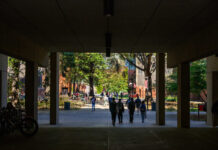
University of Louisville researchers found that 40 percent of the homeless youth surveyed in Louisville and southern Indiana reported they had been victims of sex trafficking, mostly in exchange for money or lodging. University officials announced the findings March 1 with Kentucky Attorney General Andy Beshear.
“That is alarming. That is something that we have to fix,” said Beshear, who detailed several efforts in motion to combat trafficking, which he called “the world’s fastest growing criminal enterprise.”
“Human trafficking represents the worst form of abuse, often to children, and it is increasing in Kentucky,” the attorney general said. “That’s why my office is partnering with the public and private sectors to enhance and improve policy measures and training opportunities to increase resources and awareness to help end human trafficking. Research such as UofL’s study is important and will help our efforts to combat this form of modern-day slavery.”
The Youth Experiences Survey studied 132 homeless youth aged 12-25 during two weeks in October 2016 to determine the scope of sex trafficking in Kentuckiana. More than three-quarters were from the area. The study showed approximately one of every two females and one of every three males reported being sex-trafficked with the average age of their first such experience at 16.
Youths who reported being sex-trafficked were more likely to be drug-addicted, diagnosed with more than one mental health problem and participate in self-harming, including suicide attempts. They also reported a high level of childhood trauma and abuse.
More than 70 percent of the sex-trafficked youth reported that technology was used as part of their victimization with smartphones being the most common. Social media apps such as Facebook, Snapchat, Twitter and Instagram also played a role in recruiting and selling.
The team hopes the findings will help communities better serve homeless youth through increased awareness of their specific experiences and needs, said Jennifer Middleton, assistant professor of social work and UofL Human Trafficking Research Initiative co-director.
The findings will be shared this month at the 2017 Central Kentucky Human Trafficking Summit at Georgetown College and next month at the Southern Indiana Human Trafficking Awareness Conference at Indiana University Southeast.
“This study provides us with a snapshot of the complexities homeless youth face, particularly youth who have experienced sex trafficking. The results highlight the need for early identification and screening of sex-trafficked youth as well as enhanced, trauma-informed services to help them,” Middleton said.
Middleton said the team’s goal is to expand the study to the entire states of Kentucky and Indiana. The next wave of data collection is underway with youth involved with the justice system.
“This work by the Kent School and the University of Louisville is going to make a difference, and I know it’s just getting started,” Beshear said.
The UofL Human Trafficking Research Initiative at the Kent School of Social Work conducted the initial survey with the aid of eight agencies that helped collect the information: YMCA Safe Place Services, Transition Age Youth Launching Realized Dreams (TAYLRD), Home of the Innocents, Haven House, Center for Women and Families, Clark County Youth Shelter, Floyd County Youth Services and the Kristy Love Foundation.
Angela Renfro, a trafficking survivor who is founder and executive director of the Kristy Love Foundation, said the research confirms “what we have known for a very long time.”
“Human trafficking is a crime and its victims are often hidden, which makes awareness important and difficult to achieve,” she said.
“It’s very important and I really thank the University of Louisville for helping us.”































